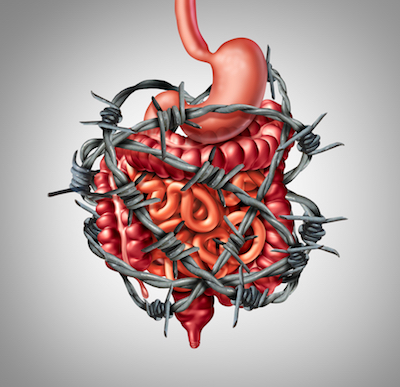Nutritional Therapy for IBS & IBD
Is Irritable Bowel Syndrome (IBS) ruling your life?
 IBS is thought to affect 17% of people in the UK, with women more likely to be affected than men.(1) IBS is a broad umbrella-term which identifies a group of symptoms which can include:
IBS is thought to affect 17% of people in the UK, with women more likely to be affected than men.(1) IBS is a broad umbrella-term which identifies a group of symptoms which can include:
- Diarrhoea or constipation, sometimes both
- Stomach cramps or pain
- Bloating and flatulence
Symptoms can come and go, or last for days, weeks or months, and can severely impact quality of life for the sufferer.
The symptoms of IBS have been linked to food passing through your gut too quickly or too slowly, oversensitive nerves in your gut, stress, and a family history of IBS (2). Lifestyle changes, medication, exercise and even anti-depressants are often prescribed to manage the symptoms of IBS (3). A nutritional therapy approach, however, can unearth and address the potential underlying root causes of YOUR IBS such as:
- SIBO (small intestine bacterial overgrowth)
- Lack of digestive enzymes
- Infections, parasites or yeast overgrowth in the gut
- Mineral deficiencies
- Heavy metal toxicity (4)
- Gut dysbiosis – an imbalance of the types and volumes of bacteria in the gut
- Intestinal permeability, also known as leaky gut
- Non-coeliac gluten sensitivity and other food intolerances (5)
![]()

Inflammatory Bowel Disease (IBD)
Inflammatory Bowel Disease is a term usually used to describe Crohn’s Disease and Ulcerative Colitis which involve inflammation of the gut. Crohn’s can affect any part of the digestive system, whilst ulcerative colitis only affects the large intestine.
Conventional treatment aims to address the symptoms of these diseases and include special diets, lifestyle changes, medication and often surgery in around 60-75% of people with Crohn’s. (6)
There’s no firm agreement on what causes Crohn’s or clcerative colitis but it’s thought that genetics, an abnormal response of the immune response to bacteria, viruses or other pathogens in the gut, smoking, stress, and diet may play a part.(7)
![]()
How can a Nutritional Therapist help?
A Nutritional Therapist recognises that everyone is unique – the underlying cause or causes of your IBS or IBD may not be the same as the next person’s. As a result, there is no one-size-fits-all approach when it comes to recommendations for YOUR particular circumstances.
After taking a full medical history and reviewing your food and lifestyle diary, a Nutritional Therapist will consider ALL the potential causes of your IBS or IBD and identify and prioritise the next steps to be taken that are relevant to you. These may include:
- Recommending dietary changes which may include the elimination of certain foods to establish any connection to your symptoms
- Work with you on a personalised AutoImmune Protocol
- Referring you to your GP for further testing where it’s accessible free of charge
- Recommending private testing not available on the NHS to identify infections
- Suggesting supplements or probiotics
- Advising on lifestyle changes including diet, exercise and relaxation
Your personalised recommendations will be reviewed at each appointment to evaluate how they have been incorporated into your life and how effective they have been and your plan will be amended and updated accordingly. A course of 4 appointments 4 to 6 weeks apart is recommended for optimal outcomes and to allow sufficient time for changes to manifest.
The Nutritional Therapists at Irrefutable Health have helped many people identify and address the root cause of their IBS and IBD with personalised plans tailored to their individual issues and goals to restore and improve digestive health.
Call us to today to start your journey to better health on 020 3034 3000 or email info@irrefutablehealth.co.uk.
Sources
- http://www.bjmp.org/content/irritable-bowel-syndrome-primary-care-physicians
- https://www.nhs.uk/conditions/irritable-bowel-syndrome-ibs/
- https://www.nhs.uk/conditions/irritable-bowel-syndrome-ibs/diet-lifestyle-and-medicines/
- https://drhyman.com/blog/2015/04/17/powerful-strategies-to-eliminate-ibs-other-gut-issues/
- https://chriskresser.com/5-causes-of-ibs-your-doctor-may-not-be-looking-for/
- https://www.nhs.uk/conditions/inflammatory-bowel-disease/
- https://www.crohnsandcolitis.org.uk/about-inflammatory-bowel-disease/crohns-disease
![]()

